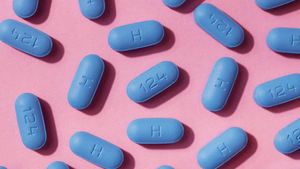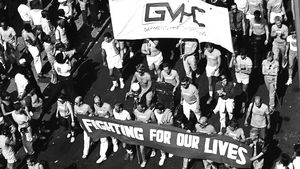LGBTQ+ advocates are breathing a sigh of relief — but with a sharp edge of caution — after the U.S. Supreme Court on Friday upheld a key provision of the Affordable Care Act that ensures access to lifesaving preventive health care, including HIV prevention medication.
Keep up with the latest in LGBTQ+ news and politics. Sign up for The Advocate's email newsletter.
In Kennedy v. Braidwood, the Court ruled 6-3 that health insurers must continue to cover services recommended by the U.S. Preventive Services Task Force without imposing out-of-pocket costs. That means pre-exposure prophylaxis or PrEP — the HIV prevention medication that slashes the risk of infection by nearly 99 percent — remains covered, along with cancer screenings, vaccines, and other critical care.
Related: BREAKING: Supreme Court rules to save free access to PrEP and other preventive care
But the 86-page ruling is hardly an unqualified victory. In a move advocates warn could politicize public health, the justices also held that the Secretary of Health and Human Services — currently Robert F. Kennedy Jr. — holds sweeping power to decide which preventive services insurers must cover.
“It is a mixed bag,” attorney José Abrigo, HIV project director at Lambda Legal, told The Advocate in an interview shortly after the ruling. “The key thing is that the preventive services infrastructure of the United States is still preserved. That structure is still there. The concerning thing is that the Court puts it more under the grip of the HHS Secretary.”
Previously, recommendations from the USPSTF — an independent panel of medical experts — went into effect automatically after one year. Now, the secretary can accept or reject those recommendations, even if they are made retroactively, he explained.
“So now the Task Force is preserved,” Abrigo said, “but the task now is we need to hold Kennedy’s feet to the fire, to listen to science, to listen to the experts, to maintain the independence of the Task Force, and to keep the nation healthy.”
Related: Christian-Owned Business Can Discriminate Against LGBTQ+ People: Court
The Braidwood case was sparked by a group of Christian business owners who claimed the ACA’s requirement to cover PrEP violated their religious beliefs, wrongly arguing the medication “promotes homosexuality.” Lower courts initially sided with them, raising fears of a nationwide rollback of coverage not only for HIV prevention but for dozens of other essential services.
“This was never about religious liberty,” a national coalition of LGBTQ+ and health advocacy organizations said in a joint statement Friday. “It has been about using LGBTQ people as a scapegoat to push a broader agenda that punishes the vulnerable.”
That coalition — including Lambda Legal, PrEP4All, the Center for Health Law and Policy Innovation, the Center for HIV Law and Policy, and the Equality Federation — celebrated the Court’s rejection of that attack.
Related: Texas PrEP Case Name Changed Because of Negative Press
“Today, the Court has made the right decision to reject this assault, upholding essential protections for preventive services and affirming that prevention and early detection of diseases save lives, improve health outcomes, and reduce long-term health costs,” the groups said in a statement.
But they also warned that shifting control of the USPSTF to political leadership poses a grave threat to public health.
“By affirming the constitutionality of the U.S. Preventive Services Task Force only through heightened oversight by the Secretary, the ruling provides the Secretary potential tools to exert significant control over what have historically been independent, science-driven health recommendations,” the statement read. “If misused and unchecked, this enhanced authority risks transforming objective medical guidance into a politicized tool susceptible to partisan interference, potentially undermining public trust in preventive care.”
Related: What to know about the Supreme Court case that could take away your access to PrEP and other care
That warning carries particular weight under Kennedy, who has a long record of promoting vaccine misinformation and conspiracy theories.
Asked whether the ruling could open new paths for the administration to target LGBTQ+ people specifically, Abrigo was cautious.
“Not to target LGBTQ people specifically,” he said. “I do think this ruling is a further concentration of executive power. What was previously nonpartisan scientific decisions are now being made partisan, like the health care of the nation, like what Kennedy is doing.”
Bennett Klein, senior director of Litigation and HIV Law at GLAD Law, called the ruling “a critical affirmation of access to life-saving preventive health care,” highlighting that the court upheld the Task Force’s authority to recommend no-cost coverage for services like cancer and diabetes screenings and HIV prevention measures such as PrEP. Klein noted PrEP is “nearly 100 percent effective in preventing HIV transmission when taken as directed.”
He stressed that relying on medical experts for guidance on preventive care “is critical to individual and public health in the U.S.” and said Friday’s decision means access to PrEP is safe “for now.” But Klein cautioned that barriers still exist, and financial access is crucial to ending the HIV epidemic, closing racial health disparities, and allowing people to thrive.
Pointing to recent scientific advances, Klein highlighted last week’s FDA approval of Lenacapavir, a long-acting injectable PrEP medication. “We hope to see the Task Force, and ultimately Secretary of Health and Human Services Robert F. Kennedy Jr., approve no-cost insurance coverage of this truly revolutionary method of HIV prevention,” he said.
Yet, Klein warned that the Supreme Court’s ruling puts a sharp spotlight on the significant authority held by the HHS Secretary, who can review, block, or influence the Task Force’s recommendations. “In this political environment, we are deeply concerned that the Court’s Braidwood ruling brings into relief the Secretary’s extraordinary power to review and block Task Force recommendations and fire and appoint members at will, which could potentially affect the integrity of future recommendations,” Klein said.
For now, Abrigo stressed, nothing changes immediately. “The bright side is, as of today, nothing has changed. Folks can still access PrEP at no cost. Folks can still access cancer screenings, et cetera, at no cost. The preventive care mandate is still in place.”
But the fight, advocates said, is far from over.
“History reminds us that silence is deadly,” the coalition said. “We hear echoes of the AIDS crisis in the Braidwood case — of those who looked away while our community died, and those who weaponized faith to justify inaction.”
Related: Appeals court maintains PrEP coverage under Obamacare in win for HIV prevention
They called on Kennedy to “follow science and not ideology” and urged Congress to be prepared to hold oversight hearings if the secretary interferes with the independence of scientific and public health bodies.
“So long as attacks on queer health care continue, our fight continues — in courtrooms, in statehouses, in clinics, and in the streets,” the coalition declared. “Because a win for LGBTQ people is a win for everyone. When we protect the most vulnerable, we strengthen the whole.”
This story is developing.










































































